Critical Review: Globalisation's Impact on Education and Policy
VerifiedAdded on 2022/09/14
|7
|2089
|16
Report
AI Summary
This report critically reviews the impact of globalisation on education, examining its multifaceted influence on policies and reforms. It defines globalisation as a dominant ideology driving cultural convergence and economic interdependence, leading to transformations in education systems worldwide. The report analyzes the effects of globalisation on curriculum, pedagogy, and the role of education in preparing students for a competitive global environment. It discusses the perspectives of various scholars, highlighting both the positive and negative consequences of globalisation on educational practices, including the emphasis on vocational training, the rise of global commodities, and the widening socioeconomic gaps. The report also explores the concept of nation-states and the shift from country-level education policies to a more globalized approach. The analysis emphasizes the importance of addressing social justice, equity, and cross-cultural values in education to foster transformative pedagogy and genuine learning environments.
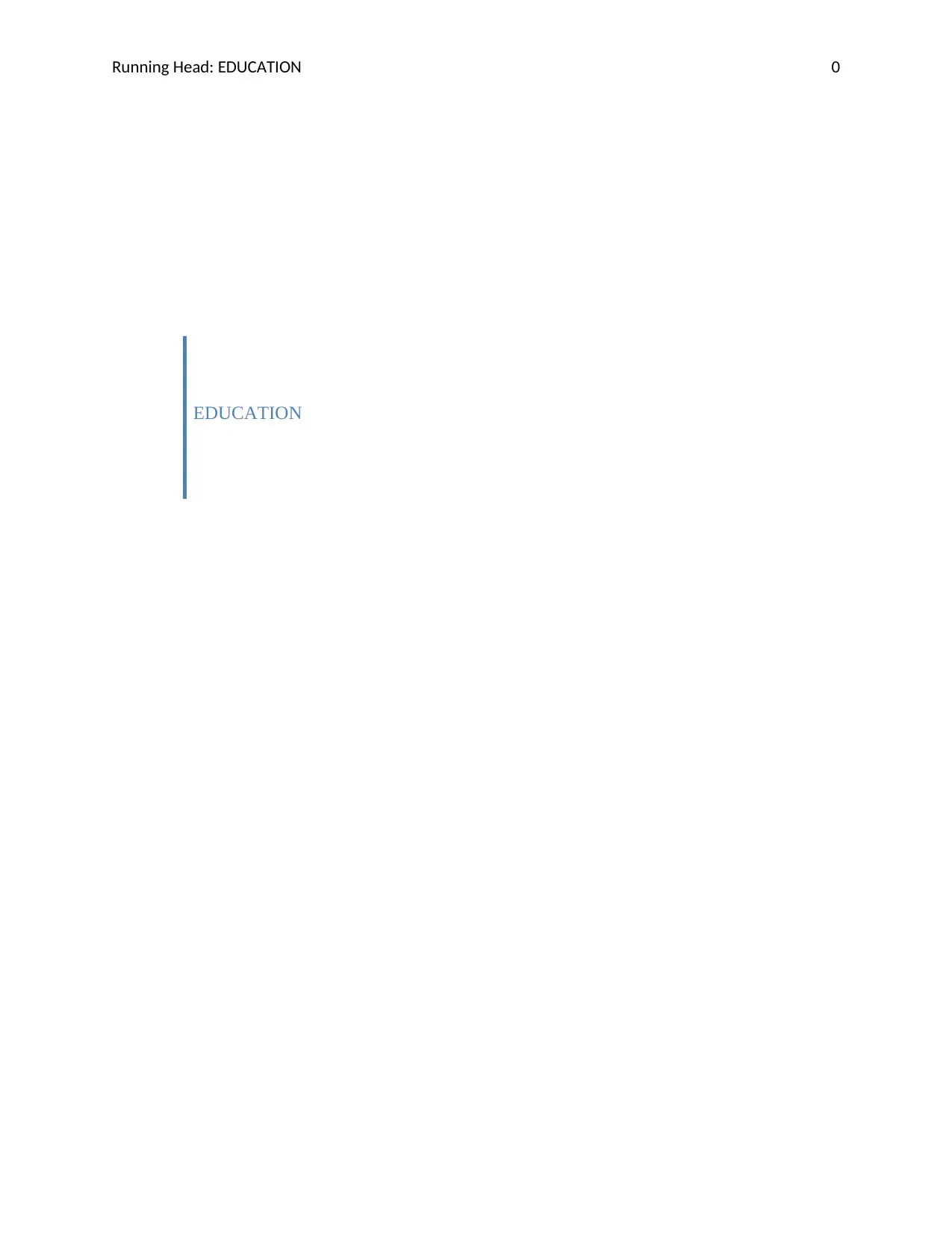
Running Head: EDUCATION 0
EDUCATION
EDUCATION
Paraphrase This Document
Need a fresh take? Get an instant paraphrase of this document with our AI Paraphraser
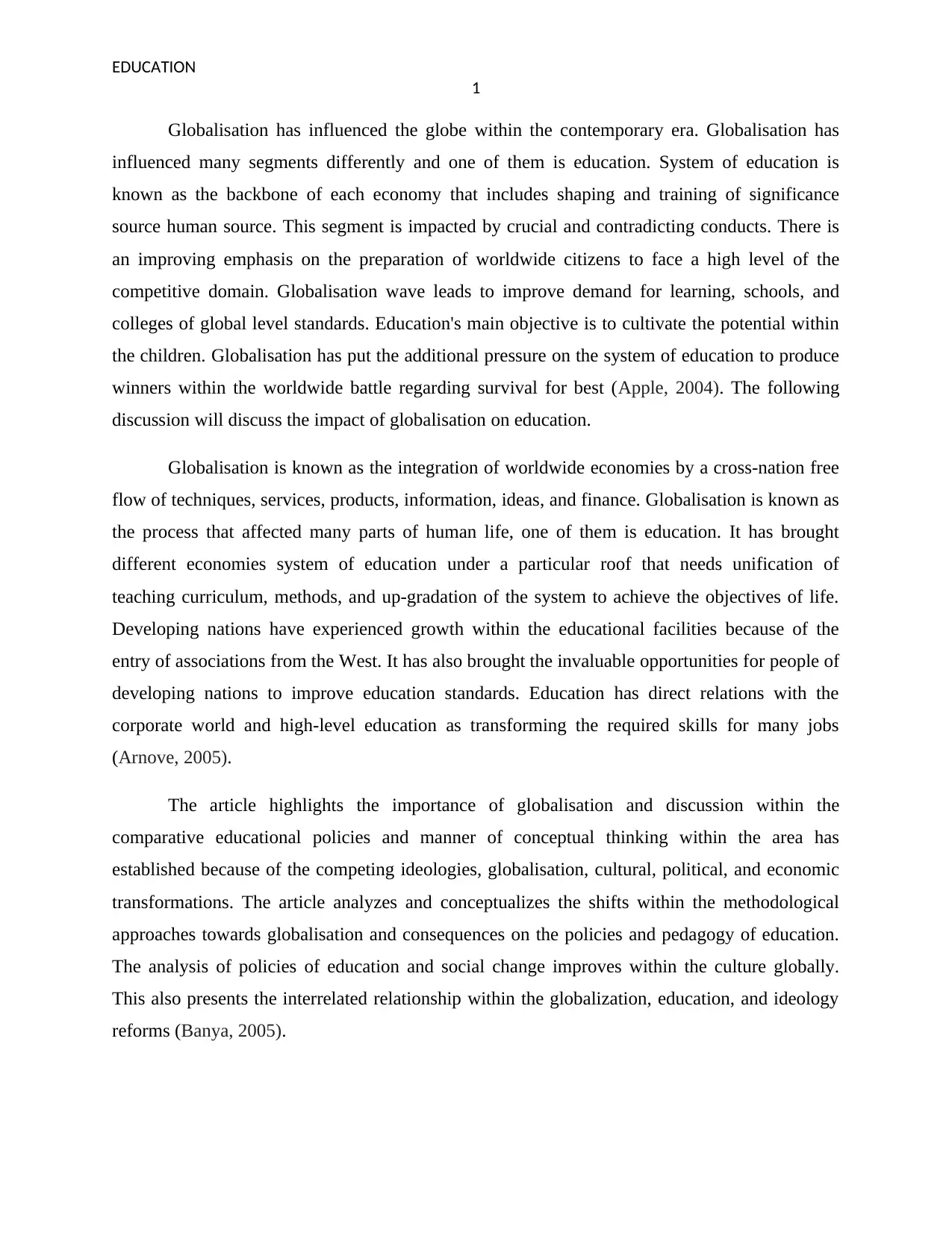
EDUCATION
1
Globalisation has influenced the globe within the contemporary era. Globalisation has
influenced many segments differently and one of them is education. System of education is
known as the backbone of each economy that includes shaping and training of significance
source human source. This segment is impacted by crucial and contradicting conducts. There is
an improving emphasis on the preparation of worldwide citizens to face a high level of the
competitive domain. Globalisation wave leads to improve demand for learning, schools, and
colleges of global level standards. Education's main objective is to cultivate the potential within
the children. Globalisation has put the additional pressure on the system of education to produce
winners within the worldwide battle regarding survival for best (Apple, 2004). The following
discussion will discuss the impact of globalisation on education.
Globalisation is known as the integration of worldwide economies by a cross-nation free
flow of techniques, services, products, information, ideas, and finance. Globalisation is known as
the process that affected many parts of human life, one of them is education. It has brought
different economies system of education under a particular roof that needs unification of
teaching curriculum, methods, and up-gradation of the system to achieve the objectives of life.
Developing nations have experienced growth within the educational facilities because of the
entry of associations from the West. It has also brought the invaluable opportunities for people of
developing nations to improve education standards. Education has direct relations with the
corporate world and high-level education as transforming the required skills for many jobs
(Arnove, 2005).
The article highlights the importance of globalisation and discussion within the
comparative educational policies and manner of conceptual thinking within the area has
established because of the competing ideologies, globalisation, cultural, political, and economic
transformations. The article analyzes and conceptualizes the shifts within the methodological
approaches towards globalisation and consequences on the policies and pedagogy of education.
The analysis of policies of education and social change improves within the culture globally.
This also presents the interrelated relationship within the globalization, education, and ideology
reforms (Banya, 2005).
1
Globalisation has influenced the globe within the contemporary era. Globalisation has
influenced many segments differently and one of them is education. System of education is
known as the backbone of each economy that includes shaping and training of significance
source human source. This segment is impacted by crucial and contradicting conducts. There is
an improving emphasis on the preparation of worldwide citizens to face a high level of the
competitive domain. Globalisation wave leads to improve demand for learning, schools, and
colleges of global level standards. Education's main objective is to cultivate the potential within
the children. Globalisation has put the additional pressure on the system of education to produce
winners within the worldwide battle regarding survival for best (Apple, 2004). The following
discussion will discuss the impact of globalisation on education.
Globalisation is known as the integration of worldwide economies by a cross-nation free
flow of techniques, services, products, information, ideas, and finance. Globalisation is known as
the process that affected many parts of human life, one of them is education. It has brought
different economies system of education under a particular roof that needs unification of
teaching curriculum, methods, and up-gradation of the system to achieve the objectives of life.
Developing nations have experienced growth within the educational facilities because of the
entry of associations from the West. It has also brought the invaluable opportunities for people of
developing nations to improve education standards. Education has direct relations with the
corporate world and high-level education as transforming the required skills for many jobs
(Arnove, 2005).
The article highlights the importance of globalisation and discussion within the
comparative educational policies and manner of conceptual thinking within the area has
established because of the competing ideologies, globalisation, cultural, political, and economic
transformations. The article analyzes and conceptualizes the shifts within the methodological
approaches towards globalisation and consequences on the policies and pedagogy of education.
The analysis of policies of education and social change improves within the culture globally.
This also presents the interrelated relationship within the globalization, education, and ideology
reforms (Banya, 2005).
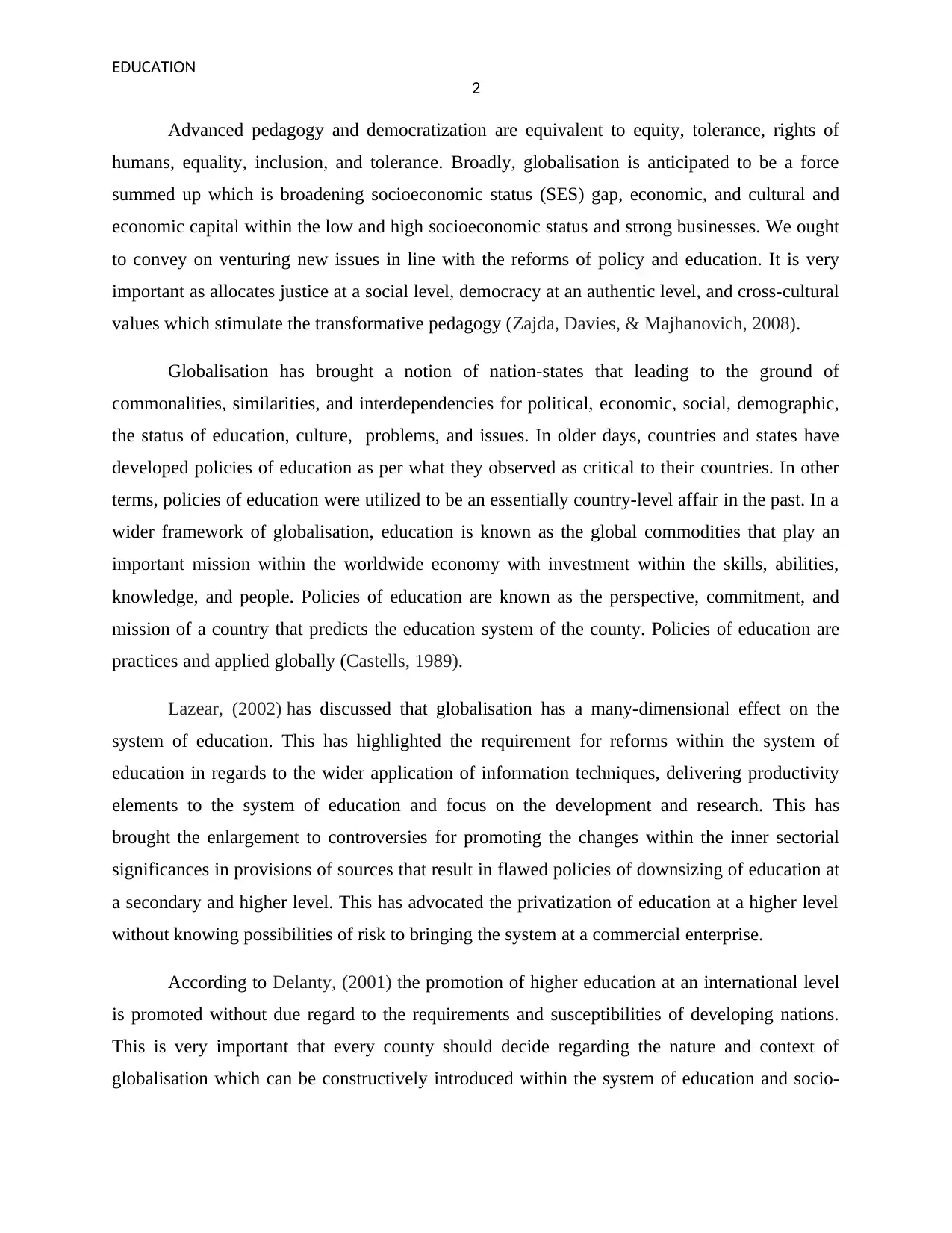
EDUCATION
2
Advanced pedagogy and democratization are equivalent to equity, tolerance, rights of
humans, equality, inclusion, and tolerance. Broadly, globalisation is anticipated to be a force
summed up which is broadening socioeconomic status (SES) gap, economic, and cultural and
economic capital within the low and high socioeconomic status and strong businesses. We ought
to convey on venturing new issues in line with the reforms of policy and education. It is very
important as allocates justice at a social level, democracy at an authentic level, and cross-cultural
values which stimulate the transformative pedagogy (Zajda, Davies, & Majhanovich, 2008).
Globalisation has brought a notion of nation-states that leading to the ground of
commonalities, similarities, and interdependencies for political, economic, social, demographic,
the status of education, culture, problems, and issues. In older days, countries and states have
developed policies of education as per what they observed as critical to their countries. In other
terms, policies of education were utilized to be an essentially country-level affair in the past. In a
wider framework of globalisation, education is known as the global commodities that play an
important mission within the worldwide economy with investment within the skills, abilities,
knowledge, and people. Policies of education are known as the perspective, commitment, and
mission of a country that predicts the education system of the county. Policies of education are
practices and applied globally (Castells, 1989).
Lazear, (2002) has discussed that globalisation has a many-dimensional effect on the
system of education. This has highlighted the requirement for reforms within the system of
education in regards to the wider application of information techniques, delivering productivity
elements to the system of education and focus on the development and research. This has
brought the enlargement to controversies for promoting the changes within the inner sectorial
significances in provisions of sources that result in flawed policies of downsizing of education at
a secondary and higher level. This has advocated the privatization of education at a higher level
without knowing possibilities of risk to bringing the system at a commercial enterprise.
According to Delanty, (2001) the promotion of higher education at an international level
is promoted without due regard to the requirements and susceptibilities of developing nations.
This is very important that every county should decide regarding the nature and context of
globalisation which can be constructively introduced within the system of education and socio-
2
Advanced pedagogy and democratization are equivalent to equity, tolerance, rights of
humans, equality, inclusion, and tolerance. Broadly, globalisation is anticipated to be a force
summed up which is broadening socioeconomic status (SES) gap, economic, and cultural and
economic capital within the low and high socioeconomic status and strong businesses. We ought
to convey on venturing new issues in line with the reforms of policy and education. It is very
important as allocates justice at a social level, democracy at an authentic level, and cross-cultural
values which stimulate the transformative pedagogy (Zajda, Davies, & Majhanovich, 2008).
Globalisation has brought a notion of nation-states that leading to the ground of
commonalities, similarities, and interdependencies for political, economic, social, demographic,
the status of education, culture, problems, and issues. In older days, countries and states have
developed policies of education as per what they observed as critical to their countries. In other
terms, policies of education were utilized to be an essentially country-level affair in the past. In a
wider framework of globalisation, education is known as the global commodities that play an
important mission within the worldwide economy with investment within the skills, abilities,
knowledge, and people. Policies of education are known as the perspective, commitment, and
mission of a country that predicts the education system of the county. Policies of education are
practices and applied globally (Castells, 1989).
Lazear, (2002) has discussed that globalisation has a many-dimensional effect on the
system of education. This has highlighted the requirement for reforms within the system of
education in regards to the wider application of information techniques, delivering productivity
elements to the system of education and focus on the development and research. This has
brought the enlargement to controversies for promoting the changes within the inner sectorial
significances in provisions of sources that result in flawed policies of downsizing of education at
a secondary and higher level. This has advocated the privatization of education at a higher level
without knowing possibilities of risk to bringing the system at a commercial enterprise.
According to Delanty, (2001) the promotion of higher education at an international level
is promoted without due regard to the requirements and susceptibilities of developing nations.
This is very important that every county should decide regarding the nature and context of
globalisation which can be constructively introduced within the system of education and socio-
⊘ This is a preview!⊘
Do you want full access?
Subscribe today to unlock all pages.

Trusted by 1+ million students worldwide
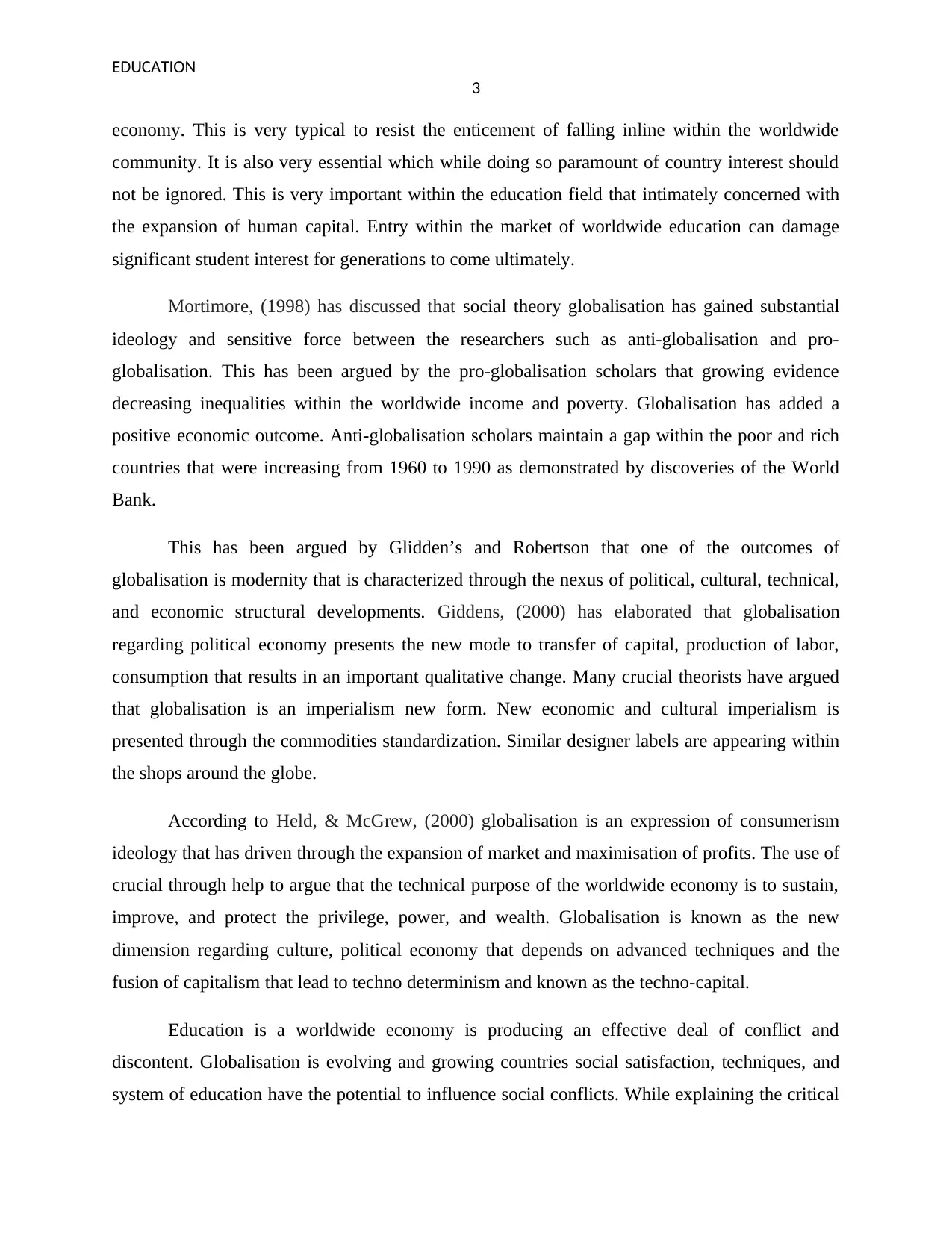
EDUCATION
3
economy. This is very typical to resist the enticement of falling inline within the worldwide
community. It is also very essential which while doing so paramount of country interest should
not be ignored. This is very important within the education field that intimately concerned with
the expansion of human capital. Entry within the market of worldwide education can damage
significant student interest for generations to come ultimately.
Mortimore, (1998) has discussed that social theory globalisation has gained substantial
ideology and sensitive force between the researchers such as anti-globalisation and pro-
globalisation. This has been argued by the pro-globalisation scholars that growing evidence
decreasing inequalities within the worldwide income and poverty. Globalisation has added a
positive economic outcome. Anti-globalisation scholars maintain a gap within the poor and rich
countries that were increasing from 1960 to 1990 as demonstrated by discoveries of the World
Bank.
This has been argued by Glidden’s and Robertson that one of the outcomes of
globalisation is modernity that is characterized through the nexus of political, cultural, technical,
and economic structural developments. Giddens, (2000) has elaborated that globalisation
regarding political economy presents the new mode to transfer of capital, production of labor,
consumption that results in an important qualitative change. Many crucial theorists have argued
that globalisation is an imperialism new form. New economic and cultural imperialism is
presented through the commodities standardization. Similar designer labels are appearing within
the shops around the globe.
According to Held, & McGrew, (2000) globalisation is an expression of consumerism
ideology that has driven through the expansion of market and maximisation of profits. The use of
crucial through help to argue that the technical purpose of the worldwide economy is to sustain,
improve, and protect the privilege, power, and wealth. Globalisation is known as the new
dimension regarding culture, political economy that depends on advanced techniques and the
fusion of capitalism that lead to techno determinism and known as the techno-capital.
Education is a worldwide economy is producing an effective deal of conflict and
discontent. Globalisation is evolving and growing countries social satisfaction, techniques, and
system of education have the potential to influence social conflicts. While explaining the critical
3
economy. This is very typical to resist the enticement of falling inline within the worldwide
community. It is also very essential which while doing so paramount of country interest should
not be ignored. This is very important within the education field that intimately concerned with
the expansion of human capital. Entry within the market of worldwide education can damage
significant student interest for generations to come ultimately.
Mortimore, (1998) has discussed that social theory globalisation has gained substantial
ideology and sensitive force between the researchers such as anti-globalisation and pro-
globalisation. This has been argued by the pro-globalisation scholars that growing evidence
decreasing inequalities within the worldwide income and poverty. Globalisation has added a
positive economic outcome. Anti-globalisation scholars maintain a gap within the poor and rich
countries that were increasing from 1960 to 1990 as demonstrated by discoveries of the World
Bank.
This has been argued by Glidden’s and Robertson that one of the outcomes of
globalisation is modernity that is characterized through the nexus of political, cultural, technical,
and economic structural developments. Giddens, (2000) has elaborated that globalisation
regarding political economy presents the new mode to transfer of capital, production of labor,
consumption that results in an important qualitative change. Many crucial theorists have argued
that globalisation is an imperialism new form. New economic and cultural imperialism is
presented through the commodities standardization. Similar designer labels are appearing within
the shops around the globe.
According to Held, & McGrew, (2000) globalisation is an expression of consumerism
ideology that has driven through the expansion of market and maximisation of profits. The use of
crucial through help to argue that the technical purpose of the worldwide economy is to sustain,
improve, and protect the privilege, power, and wealth. Globalisation is known as the new
dimension regarding culture, political economy that depends on advanced techniques and the
fusion of capitalism that lead to techno determinism and known as the techno-capital.
Education is a worldwide economy is producing an effective deal of conflict and
discontent. Globalisation is evolving and growing countries social satisfaction, techniques, and
system of education have the potential to influence social conflicts. While explaining the critical
Paraphrase This Document
Need a fresh take? Get an instant paraphrase of this document with our AI Paraphraser
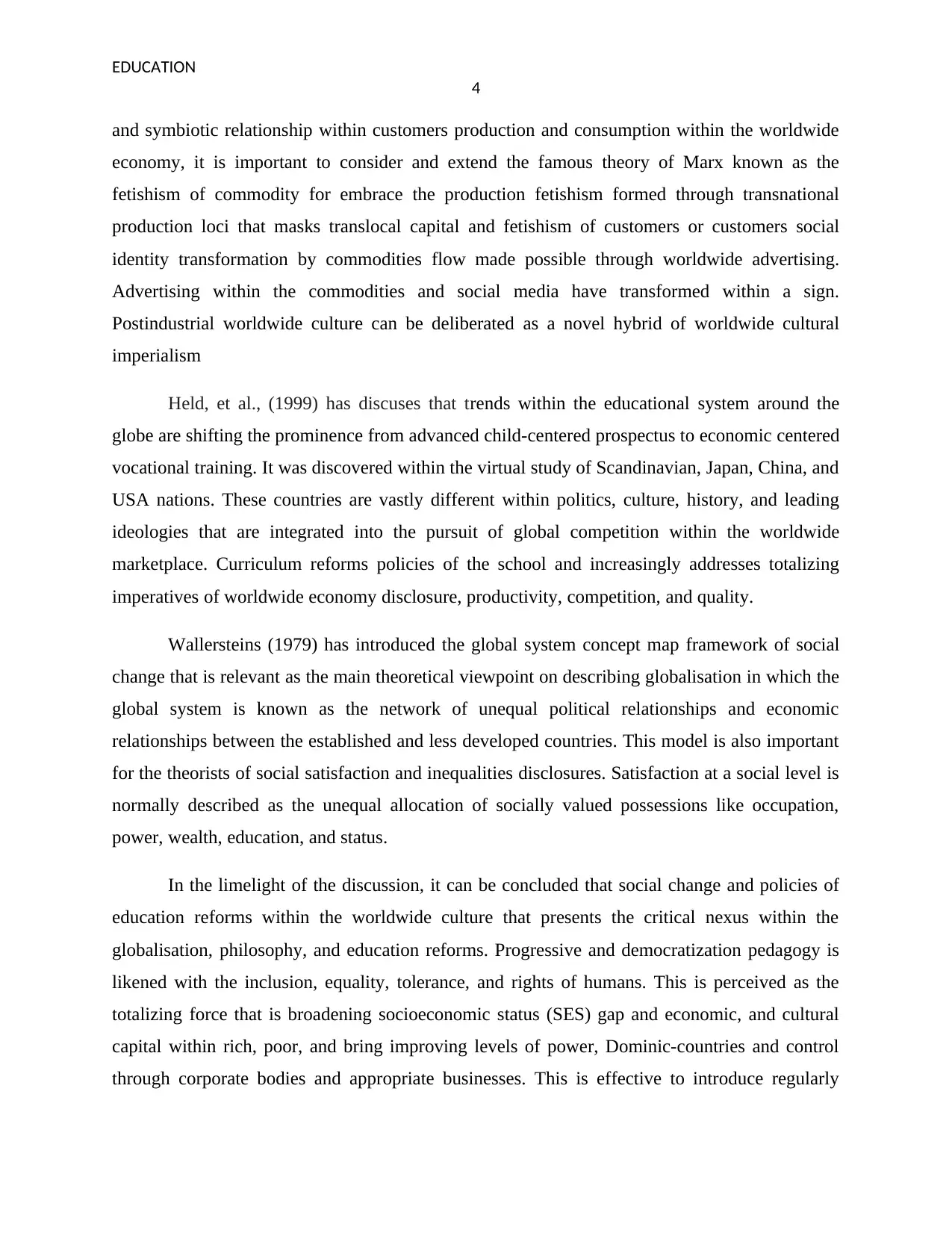
EDUCATION
4
and symbiotic relationship within customers production and consumption within the worldwide
economy, it is important to consider and extend the famous theory of Marx known as the
fetishism of commodity for embrace the production fetishism formed through transnational
production loci that masks translocal capital and fetishism of customers or customers social
identity transformation by commodities flow made possible through worldwide advertising.
Advertising within the commodities and social media have transformed within a sign.
Postindustrial worldwide culture can be deliberated as a novel hybrid of worldwide cultural
imperialism
Held, et al., (1999) has discuses that trends within the educational system around the
globe are shifting the prominence from advanced child-centered prospectus to economic centered
vocational training. It was discovered within the virtual study of Scandinavian, Japan, China, and
USA nations. These countries are vastly different within politics, culture, history, and leading
ideologies that are integrated into the pursuit of global competition within the worldwide
marketplace. Curriculum reforms policies of the school and increasingly addresses totalizing
imperatives of worldwide economy disclosure, productivity, competition, and quality.
Wallersteins (1979) has introduced the global system concept map framework of social
change that is relevant as the main theoretical viewpoint on describing globalisation in which the
global system is known as the network of unequal political relationships and economic
relationships between the established and less developed countries. This model is also important
for the theorists of social satisfaction and inequalities disclosures. Satisfaction at a social level is
normally described as the unequal allocation of socially valued possessions like occupation,
power, wealth, education, and status.
In the limelight of the discussion, it can be concluded that social change and policies of
education reforms within the worldwide culture that presents the critical nexus within the
globalisation, philosophy, and education reforms. Progressive and democratization pedagogy is
likened with the inclusion, equality, tolerance, and rights of humans. This is perceived as the
totalizing force that is broadening socioeconomic status (SES) gap and economic, and cultural
capital within rich, poor, and bring improving levels of power, Dominic-countries and control
through corporate bodies and appropriate businesses. This is effective to introduce regularly
4
and symbiotic relationship within customers production and consumption within the worldwide
economy, it is important to consider and extend the famous theory of Marx known as the
fetishism of commodity for embrace the production fetishism formed through transnational
production loci that masks translocal capital and fetishism of customers or customers social
identity transformation by commodities flow made possible through worldwide advertising.
Advertising within the commodities and social media have transformed within a sign.
Postindustrial worldwide culture can be deliberated as a novel hybrid of worldwide cultural
imperialism
Held, et al., (1999) has discuses that trends within the educational system around the
globe are shifting the prominence from advanced child-centered prospectus to economic centered
vocational training. It was discovered within the virtual study of Scandinavian, Japan, China, and
USA nations. These countries are vastly different within politics, culture, history, and leading
ideologies that are integrated into the pursuit of global competition within the worldwide
marketplace. Curriculum reforms policies of the school and increasingly addresses totalizing
imperatives of worldwide economy disclosure, productivity, competition, and quality.
Wallersteins (1979) has introduced the global system concept map framework of social
change that is relevant as the main theoretical viewpoint on describing globalisation in which the
global system is known as the network of unequal political relationships and economic
relationships between the established and less developed countries. This model is also important
for the theorists of social satisfaction and inequalities disclosures. Satisfaction at a social level is
normally described as the unequal allocation of socially valued possessions like occupation,
power, wealth, education, and status.
In the limelight of the discussion, it can be concluded that social change and policies of
education reforms within the worldwide culture that presents the critical nexus within the
globalisation, philosophy, and education reforms. Progressive and democratization pedagogy is
likened with the inclusion, equality, tolerance, and rights of humans. This is perceived as the
totalizing force that is broadening socioeconomic status (SES) gap and economic, and cultural
capital within rich, poor, and bring improving levels of power, Dominic-countries and control
through corporate bodies and appropriate businesses. This is effective to introduce regularly
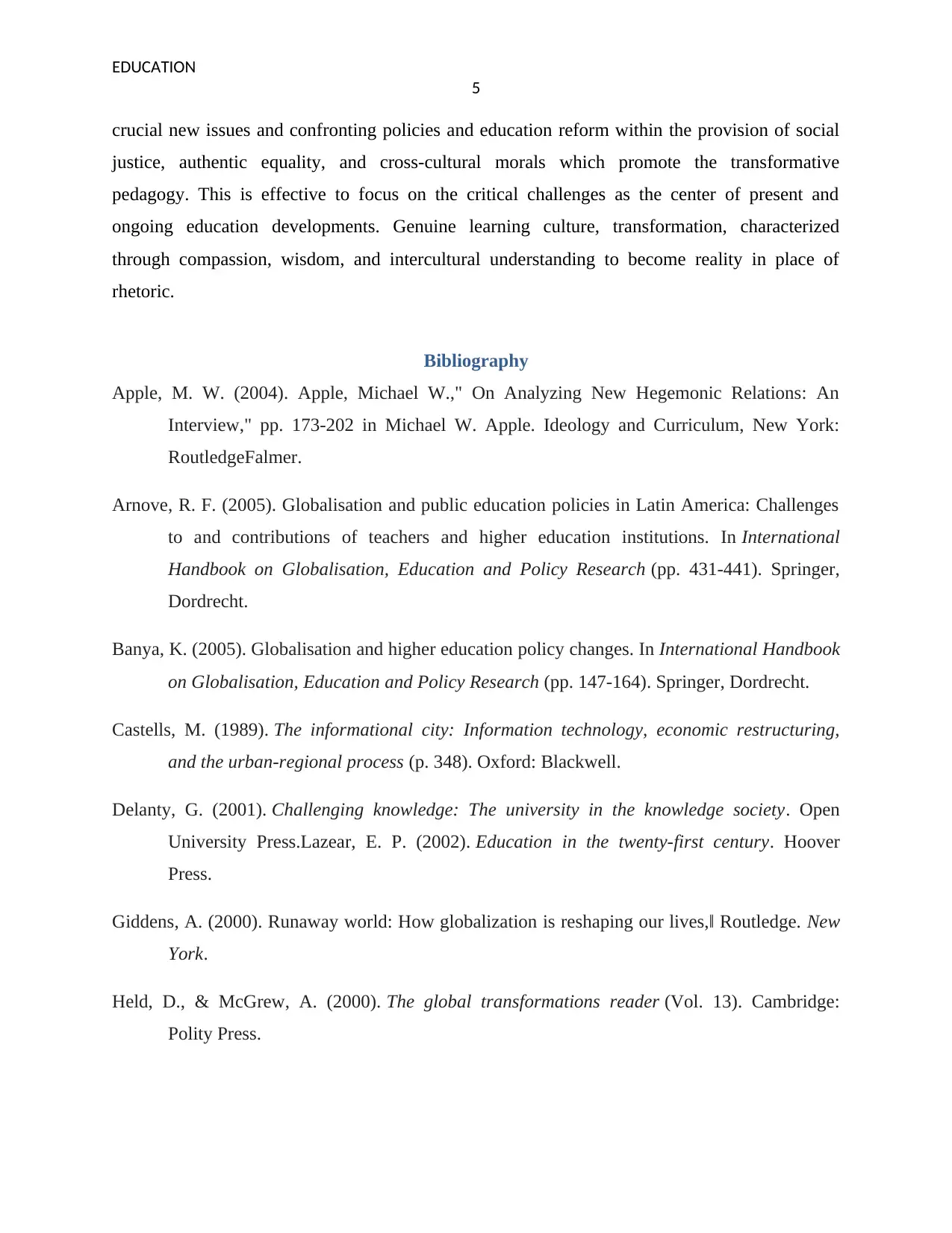
EDUCATION
5
crucial new issues and confronting policies and education reform within the provision of social
justice, authentic equality, and cross-cultural morals which promote the transformative
pedagogy. This is effective to focus on the critical challenges as the center of present and
ongoing education developments. Genuine learning culture, transformation, characterized
through compassion, wisdom, and intercultural understanding to become reality in place of
rhetoric.
Bibliography
Apple, M. W. (2004). Apple, Michael W.," On Analyzing New Hegemonic Relations: An
Interview," pp. 173-202 in Michael W. Apple. Ideology and Curriculum, New York:
RoutledgeFalmer.
Arnove, R. F. (2005). Globalisation and public education policies in Latin America: Challenges
to and contributions of teachers and higher education institutions. In International
Handbook on Globalisation, Education and Policy Research (pp. 431-441). Springer,
Dordrecht.
Banya, K. (2005). Globalisation and higher education policy changes. In International Handbook
on Globalisation, Education and Policy Research (pp. 147-164). Springer, Dordrecht.
Castells, M. (1989). The informational city: Information technology, economic restructuring,
and the urban-regional process (p. 348). Oxford: Blackwell.
Delanty, G. (2001). Challenging knowledge: The university in the knowledge society. Open
University Press.Lazear, E. P. (2002). Education in the twenty-first century. Hoover
Press.
Giddens, A. (2000). Runaway world: How globalization is reshaping our lives,‖ Routledge. New
York.
Held, D., & McGrew, A. (2000). The global transformations reader (Vol. 13). Cambridge:
Polity Press.
5
crucial new issues and confronting policies and education reform within the provision of social
justice, authentic equality, and cross-cultural morals which promote the transformative
pedagogy. This is effective to focus on the critical challenges as the center of present and
ongoing education developments. Genuine learning culture, transformation, characterized
through compassion, wisdom, and intercultural understanding to become reality in place of
rhetoric.
Bibliography
Apple, M. W. (2004). Apple, Michael W.," On Analyzing New Hegemonic Relations: An
Interview," pp. 173-202 in Michael W. Apple. Ideology and Curriculum, New York:
RoutledgeFalmer.
Arnove, R. F. (2005). Globalisation and public education policies in Latin America: Challenges
to and contributions of teachers and higher education institutions. In International
Handbook on Globalisation, Education and Policy Research (pp. 431-441). Springer,
Dordrecht.
Banya, K. (2005). Globalisation and higher education policy changes. In International Handbook
on Globalisation, Education and Policy Research (pp. 147-164). Springer, Dordrecht.
Castells, M. (1989). The informational city: Information technology, economic restructuring,
and the urban-regional process (p. 348). Oxford: Blackwell.
Delanty, G. (2001). Challenging knowledge: The university in the knowledge society. Open
University Press.Lazear, E. P. (2002). Education in the twenty-first century. Hoover
Press.
Giddens, A. (2000). Runaway world: How globalization is reshaping our lives,‖ Routledge. New
York.
Held, D., & McGrew, A. (2000). The global transformations reader (Vol. 13). Cambridge:
Polity Press.
⊘ This is a preview!⊘
Do you want full access?
Subscribe today to unlock all pages.

Trusted by 1+ million students worldwide
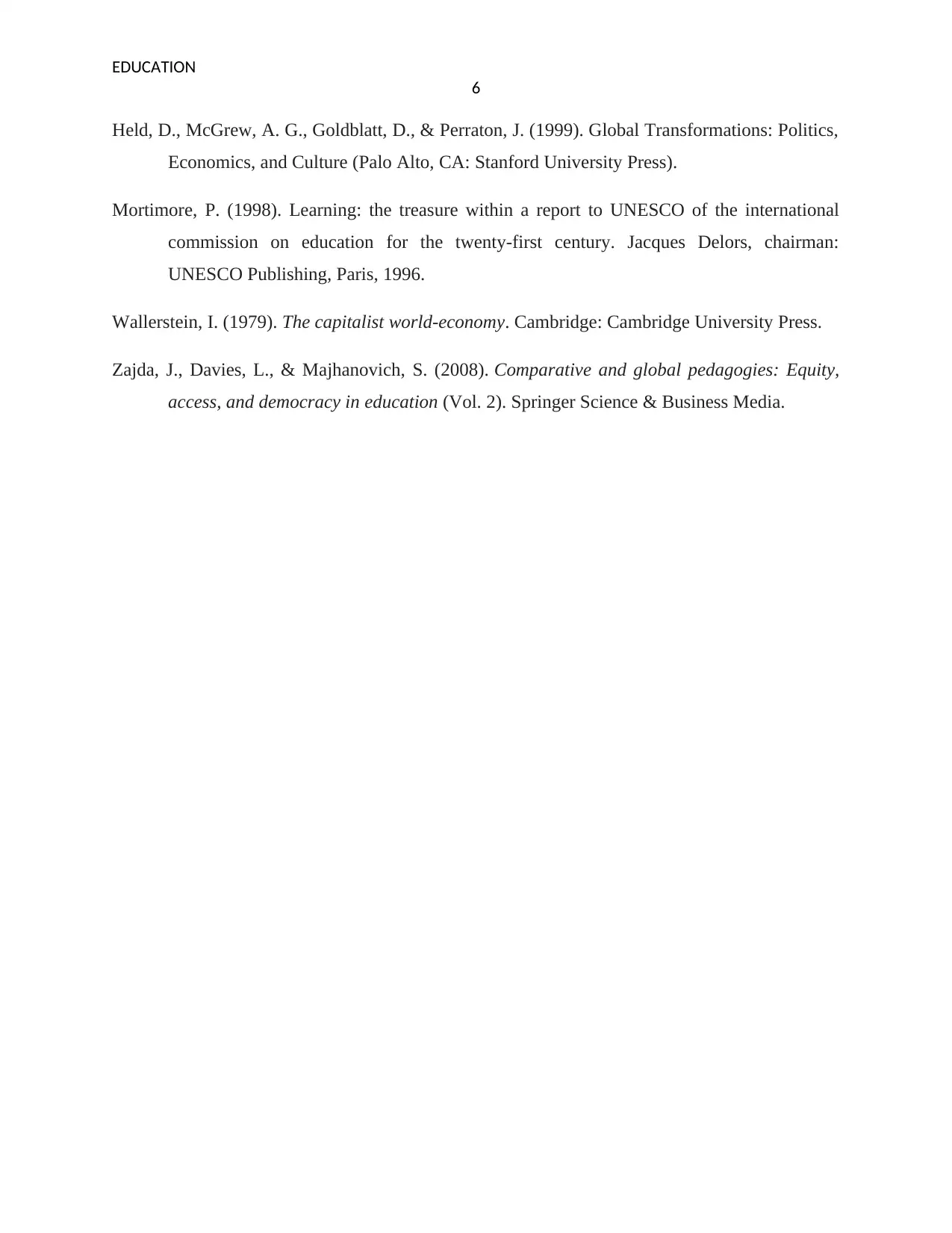
EDUCATION
6
Held, D., McGrew, A. G., Goldblatt, D., & Perraton, J. (1999). Global Transformations: Politics,
Economics, and Culture (Palo Alto, CA: Stanford University Press).
Mortimore, P. (1998). Learning: the treasure within a report to UNESCO of the international
commission on education for the twenty-first century. Jacques Delors, chairman:
UNESCO Publishing, Paris, 1996.
Wallerstein, I. (1979). The capitalist world-economy. Cambridge: Cambridge University Press.
Zajda, J., Davies, L., & Majhanovich, S. (2008). Comparative and global pedagogies: Equity,
access, and democracy in education (Vol. 2). Springer Science & Business Media.
6
Held, D., McGrew, A. G., Goldblatt, D., & Perraton, J. (1999). Global Transformations: Politics,
Economics, and Culture (Palo Alto, CA: Stanford University Press).
Mortimore, P. (1998). Learning: the treasure within a report to UNESCO of the international
commission on education for the twenty-first century. Jacques Delors, chairman:
UNESCO Publishing, Paris, 1996.
Wallerstein, I. (1979). The capitalist world-economy. Cambridge: Cambridge University Press.
Zajda, J., Davies, L., & Majhanovich, S. (2008). Comparative and global pedagogies: Equity,
access, and democracy in education (Vol. 2). Springer Science & Business Media.
1 out of 7
Related Documents
Your All-in-One AI-Powered Toolkit for Academic Success.
+13062052269
info@desklib.com
Available 24*7 on WhatsApp / Email
![[object Object]](/_next/static/media/star-bottom.7253800d.svg)
Unlock your academic potential
Copyright © 2020–2026 A2Z Services. All Rights Reserved. Developed and managed by ZUCOL.





